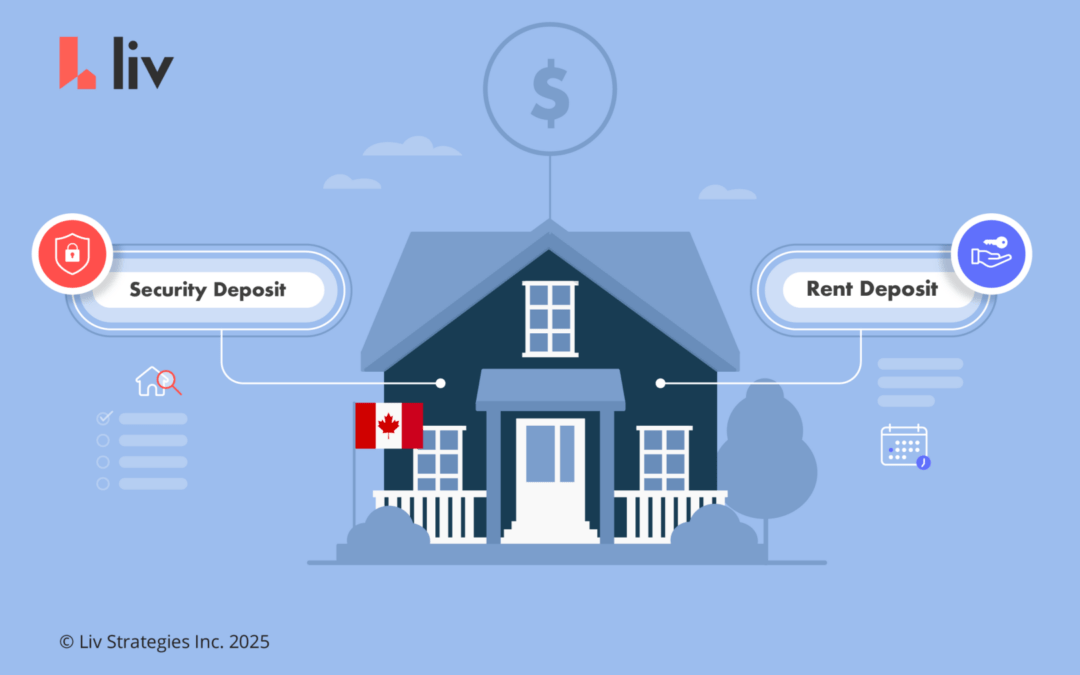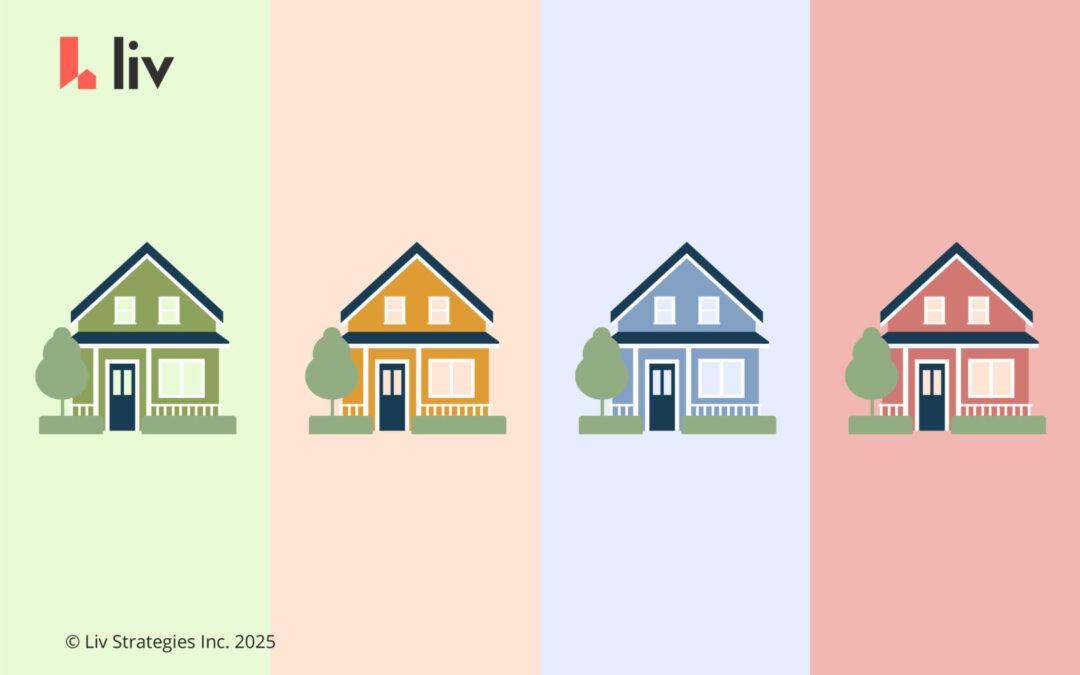Stratas are a form of housing ownership that is unique to British Columbia. Strata housing provides plenty of benefits to homeowners, but when it comes to renting within a strata property, things can get a tad more complex. Under the Strata Property Act, residents of stratas in B.C. find themselves in a unique housing situation that comes with its own rules & regulations in addition to existing tenancy law. In this post, liv.rent will break down the key aspects of renting in a strata in B.C., focusing on the rights, responsibilities, and challenges that both landlords and tenants may encounter under this type of arrangement.
Join Our Newsletter
For more info on rental laws and policies (e.g. eviction, lease agreements, repairs & maintenance), subscribe to get the latest news.
What is a strata?
‘Strata’ refers to a form of property ownership in which individuals own and have exclusive rights to their individual units within a multi-unit building or development while sharing ownership and responsibilities for common areas and amenities with other unit owners.
In Vancouver and other areas of the Lower Mainland, strata can come in the form of apartments, townhouses, duplexes or even single-family homes owned by a governing body known as the strata corporation – or strata for short. However, a strata can also be land, just rarely in Vancouver. When you buy one of these properties, you become a co-owner of the self-governed strata corporation and as such, you are held accountable alongside other owners for certain fees, duties and responsibilities. In the eyes of the law, strata corporations can do everything that an individual homeowner can do – like purchase goods & services, and sue or be sued.
Renting in a strata under the Strata Property Act
Until recently, individual stratas were able to create bylaws to prohibit or restrict renting. As of November 24, 2022, however, no strata corporation or section is allowed to have a residential rental restriction bylaw. This means that landlords may rent to any tenants whose applications they approve, with the exception of short-term tenancies – which may still be banned or limited.
Here, we’ll go over some of the key things renters and landlords should be aware of when renting in a strata.
Renting in a strata: for renters
When renting in a strata, tenants are subject to the same regulations as homeowners under the Strata Property Act, and must also adhere to that strata’s bylaws and rules. Tenants should be provided with a copy of the strata’s current bylaws and rules as part of the Form K: Notice of Tenant’s Responsibilities lease addendum.
Tenants in a strata will also have access to common property (though fees may apply), and can even request short-term exclusive use of shared areas. Tenants also have the right to attend meetings and participate in discussions, if given permission.
If a tenant violates a bylaw or rule and is responsible for an associated fee, that fee may be collected from the landlord instead. In this case, the tenant would be obligated to repay the landlord.
If tenants are to sign a “long-term” lease, three years or more in this case, they then have the same rights and obligations as owners under the Strata Property Act. This includes paying fees that would normally be the responsibility of the owner, and maintaining parts of the strata lot that would be the owner’s responsibility.
You can find a complete overview of tenants’ responsibilities in a strata here.
Renting in a strata: for landlords
Landlords will also need to comply with the rules & bylaws outlined in the Form K: the Notice of Tenant’s Responsibilities lease addendum, in addition to the legislation in the Strata Property Act. Further, landlords must present both their new tenants and the strata council with a copy of the Form K, signed by both parties. If either party is found to be violating the strata’s bylaws, the owner may be responsible for the associated fines or fees.
Landlords are within their rights to evict a tenant who repeatedly violates strata bylaws. The strata council can also take steps to evict tenants.
In the case of a long-term tenancy, landlords must not interfere with the strata lot or common property in a way that would be unreasonable.
Landlords may also assign any of their rights and obligations to the tenants, provided they inform both the tenant, and strata council in writing. Tenants cannot be made responsible for paying fines on behalf of the owner.
You can find a complete overview of landlords’ responsibilities in a strata here.
>> Recommended Reading: Understanding Lease Addendums Part 2: Common Addendums And How To Use Them
What are the responsibilities of a strata homeowner?
Homeowners who are part of a strata council have several key duties beyond the regular responsibilities of a property owner. Here’s a quick breakdown of some of the common responsibilities of strata owners:
- Attending regular meetings to help decide on things like rule changes, financial matters, and maintenance
- Approving an annual budget and electing a strata council
- Shared responsibility for the administration of the corporation, including taxation and adherence to the Strata Property Act
- The upkeep, maintenance, repairs and general appearance of the entire strata complex
- Respecting and following the strata by-laws
The strata council will normally hire companies to perform property maintenance and accounting responsibilities. However, if there is a willing owner with an accounting background, they can volunteer to perform this function.
What are strata fees?
Homeowners who are part of a strata will also be responsible for paying monthly strata fees. These fees are intended to cover shared expenses, such as:
- Building maintenance (repairs, power washing, painting, window washing, snow removal)
- Landscaping
- Building amenities (gym, pool etc.)
- Security
- Insurance
- Some utilities
What they cover can vary significantly from strata to strata so make sure you find out what is included in these fees.
A portion of these fees must also go to the Contingency Reserve Fund (CRF) to pay for common expenses that occur less frequently or not at all. Currently in BC, The Strata Property regulations require that the CRF must have a minimum level of funding equivalent to 25% of the annual operating fund.
In addition, owners can be called upon to pay special levies for matters affecting the strata corporation, including the repair and maintenance of common property and assets like replacing the roof or upgrading an elevator if contingency funds do not cover it. However, 75% of the strata must approve the collection of such a levy.
What are Strata bylaws?
Each strata can establish bylaws that owners and renters must follow. These might include bans on pets, smoking, barbecues and even rentals and/or outline what repairs are the responsibility of the strata vs. unit owner. They can even go so far as to dictate acceptable window coverings. If you do not comply with the strata bylaws, you risk facing disciplinary action including fines.
Who is responsible for repairs?
This will vary from strata to strata but in general, the strata corporation will be responsible for repairing items that are collectively shared like a roof or sprinkler system or anything else defined as common property (any part of the development shown on the strata plan that is not part of an individual strata unit) or limited common property (a part of the common property designated on the strata plan for the exclusive use of one or more strata units like balconies or parking spots).
For more information on Repairs & Maintenance in a Strata, click here.
>> Recommended Reading: Your guide to landlord & tenant responsibilities in BC
What rights do strata owners have?
As a part owner of the strata, it is important for you to ensure the strata corp is held accountable and acts responsibly on matters concerning the entire strata property or individual owners or units. You have many of the same rights as a traditional home owner but as a co-owner of a strata corporation, you should think of your fellow owners as business partners as well as neighbours.
As such you have the right to:
- Vote at any general meeting.
- Request and receive certain records from the strata council.
- Instruct the strata council by majority vote at general meetings.
- Limit the power of the strata council by majority vote at general meetings.
- Call for general meetings with a petition of a certain percentage of the owners
- Add items to the agenda at general meetings with a petition of a certain percentage of the owners.
- Seek a court or arbitration order against unfair acts of the strata corporation or strata council.
- Go to the Civil Resolution Tribunal, to enforce the strata council to follow the Strata Property Act, regulations, bylaws or rules or to resolve a conflict.

Rethink The Way You Rent
Not on liv.rent yet? Experience the ease of digital applications & contracts, verified tenants & landlords, virtual tours and more – all on one platform. Sign up for free or download the app.
Subscribe to receive the latest tenant & landlord tips and get notified about changes in the Canadian rental market.
>> Stay up-to-date on the average rent in Vancouver, Toronto and Montreal: Rent Reports.



0 Comments